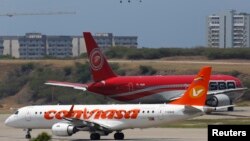CARACAS —
Venezuela's government will allow foreign airlines to repatriate $3.8 billion in ticket sales revenues that had been stuck inside the country due to currency controls, Venezuela's airline industry association said on Friday.
The South American nation requires airlines to bill tickets in the local bolivar currency. For close to two years the state currency board has denied airline requests to convert ticket sales revenues into hard currency and repatriate the funds.
The Venezuelan Airlines Association, or ALAV, said the government had promised to recognize the full amounts of ticket sales revenues using the exchange rate in place at the time the fares were sold.
The group's president, Humberto Figuera, said the funds would be progressively released between now and the end of 2015.
Government officials had previously suggested airlines would have to repatriate the revenue at a considerably weaker exchange rate created through a newly launched currency platform, which would have implied losses of up to 90 percent.
The International Air Transport Association, or IATA, said in an interview this week that some airlines were considering ceasing operations because of the frozen funds and that the government had in the past promised to allow the funds to be repatriated.
Alternative solutions including payment in bonds or fuel were discussed but never implemented, IATA Chief Executive Tony Tyler said. Within the past year, 11 airlines that have been flying to Venezuela have reduced their operations by between 15 percent and 78 percent, he said.
Air Canada suspended its operations this month, citing security concerns related to street protests, and Venezuela immediately cut ties to the airline.
Major airlines flying to Venezuela include American Airlines , Lufthansa, Delta, Avianca and Copa.
The South American nation requires airlines to bill tickets in the local bolivar currency. For close to two years the state currency board has denied airline requests to convert ticket sales revenues into hard currency and repatriate the funds.
The Venezuelan Airlines Association, or ALAV, said the government had promised to recognize the full amounts of ticket sales revenues using the exchange rate in place at the time the fares were sold.
The group's president, Humberto Figuera, said the funds would be progressively released between now and the end of 2015.
Government officials had previously suggested airlines would have to repatriate the revenue at a considerably weaker exchange rate created through a newly launched currency platform, which would have implied losses of up to 90 percent.
The International Air Transport Association, or IATA, said in an interview this week that some airlines were considering ceasing operations because of the frozen funds and that the government had in the past promised to allow the funds to be repatriated.
Alternative solutions including payment in bonds or fuel were discussed but never implemented, IATA Chief Executive Tony Tyler said. Within the past year, 11 airlines that have been flying to Venezuela have reduced their operations by between 15 percent and 78 percent, he said.
Air Canada suspended its operations this month, citing security concerns related to street protests, and Venezuela immediately cut ties to the airline.
Major airlines flying to Venezuela include American Airlines , Lufthansa, Delta, Avianca and Copa.





